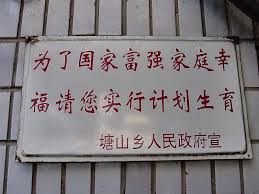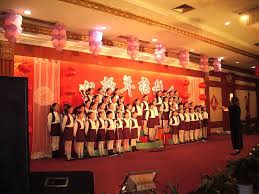 Just in time for our mass incarceration – I mean, our leisurely sheltering at home — Amazon Prime has released its award-winning documentary about a killing scourge that invaded China. No, this is not the scourge currently circling the globe and leading to draconian measures to eradicate it, but China’s draconian population control that upended lives, turned neighbors into informers and resulted in forced sterilizations and the deaths of untold wanted babies who were deliberately killed or abandoned.
Just in time for our mass incarceration – I mean, our leisurely sheltering at home — Amazon Prime has released its award-winning documentary about a killing scourge that invaded China. No, this is not the scourge currently circling the globe and leading to draconian measures to eradicate it, but China’s draconian population control that upended lives, turned neighbors into informers and resulted in forced sterilizations and the deaths of untold wanted babies who were deliberately killed or abandoned.
One Child Nation examines the personal toll levied by China’s 35-year one-child policy (1979-2015). It led to a number of sorrowful No’s: No brothers. No sisters. No cousins. No aunts. No uncles. No nieces. No nephews. And by the turn of the 21st century it began to mean No wives as well, thanks to an insidious practice that will be described below. For a culture that revered family and ancestry, the policy was a heavy blow. But the most persistent “No” has been “No freedom for you.”
Nanfu Wang was one of those children, born in 1985 under the one-child policy. Because her family lived in a rural area, they were able to lobby for a second child, but only after much pleading not to be sterilized and then agreeing to wait five years after Nanfu’s birth before getting pregnant again. Had the second child been another girl, Nanfu’s grandmother stood by at the birthing, basket in hand, to whisk the offending second daughter away to death by abandonment. She talks about this in the documentary with a matter-of-fact air, no emotion, because that’s just what you did back then.
Now living in the United States and the mother of a little boy, Nanfu returned to China to interview people about the one-child policy and how it had affected them. The film, One Child Nation, is gloomy, authentic and chilling. Nanfu describes the environment in which she grew up: the propaganda that appeared on “buildings, walls, posters, playing cards, calendars, matches, and blended into the background of life.” Songs and entertainment had extolled the policy in bouncy jingles performed in school assemblies, folk art and classic operas:
 “Fewer children make for a happier life”
“Fewer children make for a happier life”
“We have taken the one-child policy to heart”
“Our lives are so great now, thanks to the government’s foresight”
“With one child, a family’s standard of living will double” they sang happily.
No wonder Nanfu felt embarrassed about the baby at home. And everyone could see her family’s lack of patriotism in the missing star on the plaque outside their house. Peer pressure was strong. Retaliation and snitching were easy.
Some of these PSAs were not so jaunty. In a clip from the era, a young girl, perhaps six, intones with an eerie, ominous smile: “If you have a second child, you break the law. You’ll be detained…Think about it!”
Punishment for resisting sterilization was swift. Roofs were razed. Homes were demolished. Families were beaten. One former midwife, who by her own count aborted or induced and then killed 60,000 babies, describes how women were “abducted, tied up, dragged like pigs to be sterilized… Women would cry, curse, go insane.”
Repeatedly, Nanfu asks those who had carried out these orders or who had accepted the policy how they felt or why they did it. The answer was always the same:
“We didn’t want it, but we had no choice.”
“Policy is policy. What could we do?”
“I had no choice…. I executed orders.”
“It was outside of my control.”
Even today, after the one-child policy has been lifted, the ambience has not changed; fear and resignation still cloud people’s eyes. When Nanfu questions the village leader, his wife rises from her card table in anger and shouts at Nanfu, “You better not get him into trouble!” Fear of being reported, even in one’s own home. is still strong.
As time passed, many began to believe the propaganda. Shuquian Jiang was an abortionist who became a national hero and received numerous awards. She still says, “The policy was absolutely correct,” although she admits that “initially I thought it was an atrocity.” Of course, what she says for the camera and what she believes in her heart might not be the same; in China, one tends to say publicly only what is acceptable. By contrast, the midwife who aborted or induced and killed 60,000 babies now works exclusively as an infertility specialist to atone for what she acknowledges as her sins.
Nanfu’s own mother said, “It was sad to demolish people’s homes, but it was necessary for China’s survival.” When Nanfu’s uncle’s wife produced a daughter, Nanfu’s mother helped him get rid of it so they could try again for a boy. She carried the baby girl into the market and left the basket on the meat counter. For two days she returned and watched to see who would take it. No one did, and the baby died, there on the meat counter. Nanfu presents numerous stories of intense sorrow, from those who executed the orders, those who were forced to endure the orders, and those who found ways to circumvent the orders.
About that final group, the most interesting is the story that involves the Duan family, who were arrested and imprisoned for human trafficking. But one person’s “trafficking” is another person’s “rescue operation.” Now out of prison, Duan describes riding his bicycle to work each day as a teenager, and “seeing four or five abandoned babies” along his way. The babies would still be there on his way back, most of them now dead. This happened day after day. All girls, of course. Eventually he began taking the babies to a local orphanage, where they could be adopted by foreign families who longed for a child. Soon others were bringing babies to Duan—trash collectors, taxi drivers, gas cylinder workers, and others who had access to the recesses where abandoned babies often ended up. Duan would take them to the orphanage, and the director would pay him for his effort. He estimates that he rescued 10,000 babies in this way. Others would say that he trafficked these babies. Duan called himself a “matchmaker.” Under such dire circumstances, I would not want to be the judge.
 One Child Nation is sobering and fascinating and heart wrenching, not only as a history of the one-child policy in China, but also as a cautionary tale of what can happen when a government convinces the people that sacrifices must be made for the greater good. It’s appalling to see how readily the policy was implemented, accepted, and embraced. It began with propaganda permeating the schools, entertainment, and media. As a young child Nanfu took part in these song-and-dance events in her school, and felt terribly embarrassed by the fact that she had a younger brother. She believed the words that she sang in those school assemblies thirty years ago. Now she muses, “Were these values my own? Or were they impressed on me at a young age?” It was only after becoming a mother herself that she began to question the policy and wonder how it had affected those forced to live through it.
One Child Nation is sobering and fascinating and heart wrenching, not only as a history of the one-child policy in China, but also as a cautionary tale of what can happen when a government convinces the people that sacrifices must be made for the greater good. It’s appalling to see how readily the policy was implemented, accepted, and embraced. It began with propaganda permeating the schools, entertainment, and media. As a young child Nanfu took part in these song-and-dance events in her school, and felt terribly embarrassed by the fact that she had a younger brother. She believed the words that she sang in those school assemblies thirty years ago. Now she muses, “Were these values my own? Or were they impressed on me at a young age?” It was only after becoming a mother herself that she began to question the policy and wonder how it had affected those forced to live through it.
Peng Wang, an artist in the film who, like Duan, was appalled to find discarded fetuses in outdoor trash heaps, describes the “long term indoctrination of the population war” and then observes sadly, “Submission to the collective destroys one’s humanity, individuality and conscience.” Nanfu adds, “When every major decision is made for you all your life, it’s hard to feel responsible for the consequences.”
I think we know the answer to Nanfu’s question about impressed values. We are watching it happen right now, as collectivist values and policies infiltrate our school curricula, entertainment media, and government edicts. In the current crisis, those who espouse a more reasoned approach to fighting the coronavirus are being called “Covid-deniers” and even “murderers.” Residents are calling 911 to report a neighbor going outside for a second run of the day or entering a grocery store without a mask. Statisticians and government agencies are using cell phone pings to track our movements. Bill Gates has recommended using facial recognition data in order to make sure people stay in their homes (with the software provided by Microsoft, of course.) And those who live in the cities are imposing their will upon those who live in the more rural areas of the Midwest.
Some governors have suggested sending the National Guard door to door to count our food and commandeer anything beyond a 14-day supply. Governor Cuomo has threatened to forcibly take medical equipment from hospitals in upstate New York and transfer it to New York City. Americans are willingly giving up the precious freedoms and protections vouchsafed in the Bill of Rights in order to force their neighbors into compliance. Basic individual rights—the right to choose for ourselves what we will do, what we will say, and how we will use our private property—are being suspended for “the greater good,” with the dubious justification that everything we do affects everyone else. Even breathing. It’s the butterfly effect run amok.
“I had no choice.” “It was out of my control.” “I had to put national policy above feelings.” “The policy was absolutely correct.” These were the justifications in China.
China was able to turn a culture that revered family into one that would kill breathing, kicking, crying babies because the people were hungry and afraid. Starvation was the result of Mao’s own ridiculous central planning and this galling truth of socialism: in a free country people are an asset, but in a socialist country people are a liability. Thus, when too many people are chasing too little rice, it’s easy to blame hunger on population (demand), rather than on production (supply). When the Chinese had “nothing to eat but rice husks” (not even the rice!) they were ready to blame anyone in order to have more food. So, babies.
A friend of mine who has spent much time in China told me recently that he has seen people eat disgusting things when they are hungry. He has watched them carry dead rats home from the fields and eat basically anything that crawls. That’s what happens when you’re starving. And eventually, bats become a delicacy. And viruses jump from animals to humans.
Americans today aren’t yet hungry, but they are afraid. The enemy is a tiny bug that no one can see. Worse, they’ve been convinced that anyone might be contagious—even those who show no symptoms whatsoever—and that the disease is utterly fatal. They are looking for a policy that will protect them. Can your freedom be rescued? Or is it about to be trafficked to the god of the greater good?
One Child Nation, directed by Nanfu Wang. Amazon Original, 2019, 88 minutes.
 Jo Ann Skousen is the founding director of the Anthem Libertarian Film Festival and co-producer of FreedomFest, “the world’s largest gathering of free minds.” The two festivals meet concurrently July 13-16 at Paris Resort Las Vegas. She teaches English literature and writing at Chapman University and Sing Sing Correctional Facility.
Jo Ann Skousen is the founding director of the Anthem Libertarian Film Festival and co-producer of FreedomFest, “the world’s largest gathering of free minds.” The two festivals meet concurrently July 13-16 at Paris Resort Las Vegas. She teaches English literature and writing at Chapman University and Sing Sing Correctional Facility.

